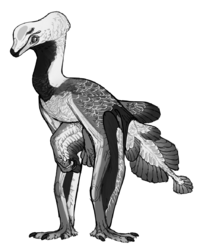Shibettan: Difference between revisions
No edit summary |
No edit summary |
||
| Line 4: | Line 4: | ||
Shibettans [Voidite: Rirkittar] [Shibettan: Æthelryth] are a species of generally beige and/or brown feathered kobold found in and around northern [[Voidkree]]. They get the name "Shibettan" from the God that a majority of them worship known as Shiber, a dragon of sort which gave birth to kobolds through it's breath, which was said to have molded clay and stone into the kobolds today though this is assumed to be a religious myth and has been stated that it has no proof to back it this claim. In Voidian society Shibettans aren't treated any differently from any other humanoid in Voidkree and are allowed to get the same jobs Voidians have. | Shibettans [Voidite: Rirkittar] [Shibettan: Æthelryth] are a species of generally beige and/or brown feathered kobold found in and around northern [[Voidkree]]. They get the name "Shibettan" from the God that a majority of them worship known as Shiber, a dragon of sort which gave birth to kobolds through it's breath, which was said to have molded clay and stone into the kobolds today though this is assumed to be a religious myth and has been stated that it has no proof to back it this claim. In Voidian society Shibettans aren't treated any differently from any other humanoid in Voidkree and are allowed to get the same jobs Voidians have. | ||
In recent centuries Shibettans have been treated better and better with their true equality with Voidians coming in the year 1584 AR where after weeks of protests by both Shibettans and Voidian alike the parliament passed the "Humanoid Equality Act". | In recent centuries Shibettans have been treated better and better with their true equality with Voidians coming in the year 1584 AR where after weeks of protests by both Shibettans and Voidian alike, the parliament passed the "Humanoid Equality Act". | ||
== General Attributes == | == General Attributes == | ||
=== Size === | === Size === | ||
Revision as of 13:08, 3 November 2022
This article is incomplete because it is pending further input from participants, or it is a work-in-progress by one author. Please comment on this article's talk page to share your input, comments and questions. Note: To contribute to this article, you may need to seek help from the author(s) of this page. |
Shibettans [Voidite: Rirkittar] [Shibettan: Æthelryth] are a species of generally beige and/or brown feathered kobold found in and around northern Voidkree. They get the name "Shibettan" from the God that a majority of them worship known as Shiber, a dragon of sort which gave birth to kobolds through it's breath, which was said to have molded clay and stone into the kobolds today though this is assumed to be a religious myth and has been stated that it has no proof to back it this claim. In Voidian society Shibettans aren't treated any differently from any other humanoid in Voidkree and are allowed to get the same jobs Voidians have.
In recent centuries Shibettans have been treated better and better with their true equality with Voidians coming in the year 1584 AR where after weeks of protests by both Shibettans and Voidian alike, the parliament passed the "Humanoid Equality Act".
General Attributes
Size
The size of the shibettans varies slightly though on average a male shibettan ranges in height from 110-130cm with females ranging in heights of 90-115cm. The tallest shibettan on record reached heights of 186.4cm which by human standards is not at all astounding but for kobolds it is an impressive height.
Diet
Shibettans, much like other kobolds are carnivorous and most of their food culture reflects that with the only plants every being used in a meal are just for seasoning.
Physical Description
Shibettans are short bipedal reptiles with a layer of brown and beige feathers across their body though a large minority of Shibettans do have some form of genetic leucism which gives them white to light grey feathers. Their lower half possess digitigrade legs which end in three clawed toes and a tail, meanwhile the upper half is relatively humanoid with the only differences being the head and face with shibettans having a short snout similar to that of a carnotaurus and a ridge of large feathers along the back of the head and neck along with two large feather covered ears.
